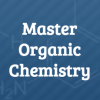Guess what? Reactions are back! This time, we’re using entirely different mechanisms to get the job done. Introducing: the radical. A radical occurs when a bond breaks and instead of one atom taking both electrons, each atom involved in the bond gets one. These radicals are often unstable, but can be used to make all new reactions take place.
As stated in the last reactions section, you’re just going to need to memorize these, both what the reactions do and how they do it.
There are a couple of reactions that involve radicals that you’ll need to know. These often involve halogens such as bromine or chlorine. Another topic introduced is radical chlorination. This topic involves adding chlorine atoms to alkanes in certain ratios. Depending on your school, these questions on exams can be free points if you understand how to find these ratios using equivalent carbons.






